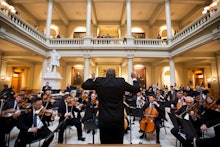Why Isn’t Classical Music Cool Anymore?

The end of an era passed recently, as Frank Music Co. closed its doors Friday. The almost 80-year-old New York institution was the last classical sheet music company in the Big Apple, and like so many similar stories over the years, the business found itself unable to compete amid digital alternatives.
"The advent of the Internet at the turn of the last century made the existence of small retailers very difficult," Heidi Rogers, Frank's former owner, told Mic. "I didn't have money to throw at advertising or SEO."
The loss of Frank's is not another story about failure to pay the rent. More broadly it speaks to the general fall of classical music. A casual search on the iTunes Store reveals no shortage to choose from, not just Bach and Mozart but also less familiar names like Reinhold Gliere and Clara Schumann. Yet not one of them appears in the iTunes Top 100 albums.
It didn't always used to be that way. In 1913, when Igor Stravinsky's "Rite of Spring" debuted in Paris at the brand-new Théâtre des Champs-Élysées, the work was so controversial it ignited a riot among concertgoers who supposedly attacked the stage, resulting in dozens of arrests. It spoke to the passion a thrilling new work could generate in an audience.
Today the genre has a certain Shakespearean musk, an archaic thing for academics, the initiated or just old, rich, people, as likely to start a riot as an artichoke. Here's why.
Cost: Classical music, previously just known as "music," was once an egalitarian pleasure. In his work Classical Music in America: A History of Its Rise and Fall, Joseph Horowitz wrote that the Chicago Orchestra of 1889 offered "workingmen's concerts" with tickets priced at less than $3, adjusting for inflation.
At an evening performance of the Metropolitan Opera in New York, all but the most dismal seats typically sell for over $100. Cheaper alternatives like Amato and City Opera have closed. As has been exhaustively documented, millennials don't have money to burn and are loathe spending it on institutions so financially uninviting.
Time: Most popular music today is pretty short. From Louie Armstrong to Katy Perry and everything in between, the average hit runs around two to four minutes, and that's no coincidence. Music became shorter as we all got busier.
Electricity, cars and leisure time gave way to apps, email, House of Cards and more apps. It all requires our attention, often simultaneously, and has taken a terrible toll on our attention span. If you're reading this on a computer, how many other tabs do you have open?
Classical music, however, doesn't care about how many emails you have to send. Beethoven's "Symphony No. 9" one of the most celebrated works in the history of music, still requires at least a solid hour of listening to nothing but sound. In our time, the combination of time, patience and discipline required has never been harder to come by.
"Getting people away from their screens and out of their house is difficult," Rogers said.
Alienation: As the pianist Stephen Hough wrote in the Guardian most of us get our first introduction to classical music in the form of a recorder; few schools have budgets for much more. The flimsy woodwind doesn't stand a chance against an electric guitar or a rap battle.
Every day our lives are filled with dismal associations of elevator music, DMVs and waiting for a subway. Official studies have trumpeted classical music's scientific value as a cure for insomnia — maybe people will fall asleep to Beyoncé in 100 years.
"It [used to be] part of everyday life," Rogers said, adding that every city once had an orchestra and taking children was just "a thing to do," like the circus.
With hundreds of years under its belt, classical music can capture pretty much every emotion in the human experience with incredible depth and accuracy, but only if people are listening. Don't take my word for it; Samuel Barber's "Adagio for Strings" says it better than words ever could: